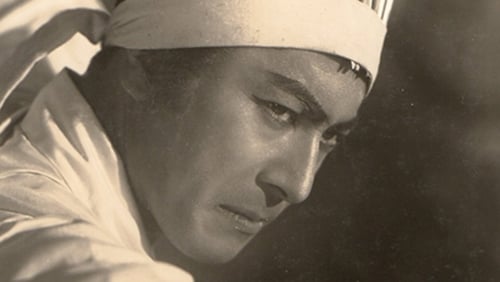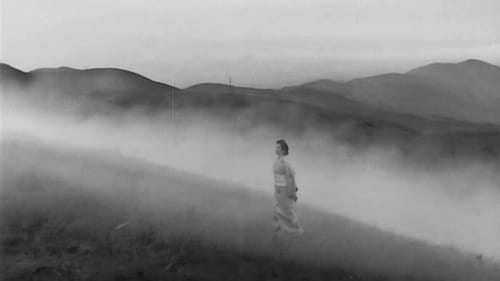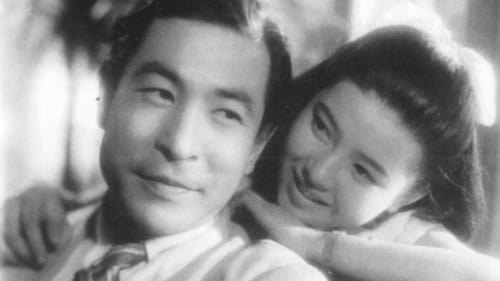
Narumi, a man out for revenge with the powers he received and a bit of help from the one who saved his life, he creates the persona of Skull Soldier and attempts to discover who really killed his sister.

Sixth film in the Boy Detectives Club series.

Fifth film in the Boy Detectives Club series.

Two youths - the serious son of a Buddhist abbot and his rakish pal - quarrel over a restaurant keeper's daughter. When one of the youths die the other boy and the girl find they cannot forget him.

Oyuki
1953 jidaigeki directed by Nobuo Nakagawa of Jigoku and Ghost of Yotsuya fame.

Shiro Yabe, a young gangster who boarded the second class on the Tokaido Line after finishing a dangerous smuggling transaction in Kobe, is next to a beautiful woman with a sad face.

Period film about a feudal era judge living in Edo

Based on the story of Shimizu no Jirocho.

Kiko Murai
In pre-war Shanghai, a man falls in love with a mysterious woman, but she eventually disappears. Back in Japan, he is obsessed by her memory and tries to recreate the world he knew then.

Kanae, who broke up with her husband and moved to her uncle's house, met two men when her father, a university professor, collapsed. Michihara, a wealthy man and Miyashita, a youth scholar. Kanae is attracted to Miyashita, but ...

The famous showdown at Kagiya corner has been told many times, but never before with the realism and intensity of this version scripted by Kurosawa Akira and starring Mifune Toshiro as the famed swordsman who must face his best friend as they are forced to take opposite sides in a vendetta caused by the murder of a family member. Told mostly in flashback as the avengers await the arrival of their quarry, this film displays true heroism in the face of fear as most of the combatants, while of the samurai class are not skilled swordsmen. They contrast sharply with the true warriors involved in this battle. Araki Mataemon (Mifune), who was not only a direct student of Yagyu Munenori, but the founder of his own sword style under the Yagyu name is a powerful force ready to assist his brother-in-law against the murderer's allies that include not only another noted sword teacher, but the deadly spear of Katsumi no Hanbei.

Shunsuke Washimi, a member of the karate club, misunderstands the affections of Chiyo, a lodging house girl who is in love with him and in the midst of a confusion challenges Yamauchi Tatsuhiko to a fight, forgetting the true core of martial arts, that should only be used as a selfdefense.

Riu
Though recognized worldwide almost exclusively for his colorful kaiju fare, director Ishirō Honda (Godzilla, Rodan, Mothra) was a natural humanist with a particular understanding of the relationship between people and their social environs. His debut fiction feature, The Blue Pearl (Aoi Shinju) – virtually unseen in the west until now – depicts the melodramatic, but keenly-observed interplay between a young man from Tokyo and two ama (pearl divers; literally “women of the sea”) in a superstitious coastal town. Though raised within the same tradition-bound crucible, the two women – Noe and Riu – are portrayed as diametric opposites; the former meek but affectionate, the latter strong-willed but jaded by a tryst with metropolitan life. Nonetheless, Honda provides equal weight to their desires and their ambitions to break free from the social mold imposed upon them from birth.

1951 Japanese movie

Ayako
Hamako has just started working for her personal hero, Madame Yuki. Her romanticized view of the Madame is broken immediately, though, as she is introduced with a ever-growing list of the Madame’s personal problems.


The Angry Street includes a great deal of location shooting in the rebuilt city, including downtown streets, residential neighborhoods, the campus of the University of Tokyo, and the high life of jazzy dance halls. Sudo (Hara Yasumi) and Mori (Uno Jukichi) are two university students who make money by picking up rich girls in dance clubs and conning them into giving them cash. Mori is the brains of the operation, and Sudo is the suave dancer who picks up the girls. Over the course of the film, Sudo becomes involved with three different girls and is drawn into the gangster milieu, which he seems unable to resist even though he is responsible for his mother, grandmother, and sister, Masako (Wakayama Setsuko). In this world of bad boys and girls, Masako is the pillar of strength and moral virtue who finally enables Mori to straighten out.

Yuki
In a village subsisting on it herring fishery, a one-eyed criminal named Jakoman terrorizes the inhabitants. One of them, the son of the head of one of the fish companies by the name of Tetsu, decides to overthrow Jakoman and his cohorts.

It was the first time in six years that I was able to step on the land of my homeland, the land of my nostalgia. It was Tokyo that had turned to burnt earth. A Tokyo with no one to rely on.

During his summer holiday, Kawasaki Ryuichi (Ryuzaki Ichiro), a handsome engineer in his late twenties, visits his teacher and mentor, Professor Inagaki (Sugai Ichiro), at his seaside home. There he meets the professor's lovely young wife, Sachiko (Hamada Yuriko), and is unsettled by the striking resemblance she bears to his wife, who died three years earlier. Attracted to Sachiko, he does his best to hide his feelings. The couple, however, senses a deep-seated melancholy in him. Attributing it to the loss of his wife, they urge him to marry their niece, Kaoru, but he is not interested. Shortly after, Fumiko , Sachiko's older sister, realizes that Sachiko and Kawasaki have feelings for each other, but she keeps her counsel. One day Kawasaki, Sachiko, and Kaoru go boating when a storm forces them to stay overnight at a hotel. Unable to sleep, Kawasaki takes a walk along the beach where he finds Sachiko, also unable to sleep. He declares his love for her.

1947 Toho film directed by Tadashi Imai

Tokiko, Second Dancing Girl
Two sisters, one a dancer and the other a script supervisor at a big movie studio, become embroiled in union activities when a strike is called in sympathy with striking railroad workers, one of whom boards with the sisters and their parents. The girls' father argues with them about their strike, but finds his views changing when he himself loses his job.













